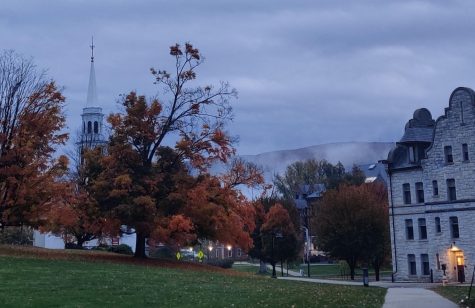Reflections on memory and returning to Sebald’s Vertigo
February 22, 2023

I think I’ve always had a poor memory, though I can’t be sure. Lately, I’ve felt a jolt of shock at the prospect of having run through half my time at the College by May — I find that I can’t quite remember as much about last semester, or the ones before, as I’d want. The strong impressions of first year have slowly given way to a blurred sense of accumulating time, and I’m left to wonder sometimes — what has actually happened? How did I get to this moment?
Amid that shock, I found myself circling back to a novel I read in a class last spring — Vertigo, written in 1990 by W. G. Sebald, a German author who lived in England. In part it relates episodes from the lives of certain authors, such as Stendhal and Franz Kafka, and in part it is the narration of a lone, paranoid man traveling through Europe. With the shadow of these authors’ experiences looming over him, he grapples with history and memory as he returns to his childhood home in Bavaria.
Usually, rereading books combats my sense of unanchored memory — thankfully, I can count on characters remaining vivid in my mind, and plot eventually returns to me — but with Vertigo, that experience eludes me. The narrator’s hypnotic strands of thought often unfurl over pages and pages, and such unending inward reflection necessitates my own disappearance into the play of sparked memories and imagination, though I am unable to pin those memories down. I can’t help but double back every few pages, having been caught up in the novel’s anxious whirl, where the mundane and momentous are relayed with equal intent, and abrupt changes of topic come to be natural in retrospect.
I have no idea how I felt or what I thought when reading this novel in the spring of 2022, other than the intended sense of disorientation — and my instinct to find answers in my notes and my camera roll came up with nothing. Vertigo seems at first to endorse a similar archival impulse — the author intersperses images relevant to the narrative throughout, often mid-sentence, as his narrator compulsively collects evidence of his travels and the past, perhaps as proof of his memories or to chart some kind of history.
Neither my photos nor his feel adequate to those tasks, though. Scrolling through my photos, I found one taken the morning of Oct. 18, 2022, apparently to capture the fog behind the trees of this Sleepy Hollow we live in. Something about it is unsatisfying — the picture overpowers my experience of the fog and its larger-than-life, fantastical quality, the memory of which fades and transmutes further the more I search for it. What really looks back at me in that photo is the indeterminate haze of remembrance.
I have recently noticed that I tend to go to unusual lengths to keep my copy of Vertigo as pristine as possible, as if it were entirely new and no one had ever read it. I realize now that I am unconsciously justifying the difficulty of having the grip of memory close around its words, which slip away from me as I read them. The novel appears to know that I am trying to do this, and anticipates it. Sebald’s narrator, having described a series of seemingly insignificant images in Verona — a dentist’s advertisement and some tonic water, the inserted photos proclaim — reflects: “They were soundless and weightless, these images and words of times gone by, flaring up briefly and instantly going out, each of them its own empty enigma.”
Maybe I should start taking notes in the margins, or take more and more pictures, but that does not ease the disquiet of Vertigo’s narrator, nor mine. Reading this novel again over the past week, though, encountering Sebald’s struggle with memory and the most grave history, I have become more attuned than before to the continuous creation of our histories, private and public — of our inner lives, our lives moving through the College, and the world outside. It’s in each successive encounter with the Williamstown fog, the written words of another person in another time and place, the faces of our loved ones, that our memory may grant us glimpses of what we had forgotten we were looking for — those soundless, weightless visions of the past.
Rijul Jain ’25 is from San Jose, Calif.








